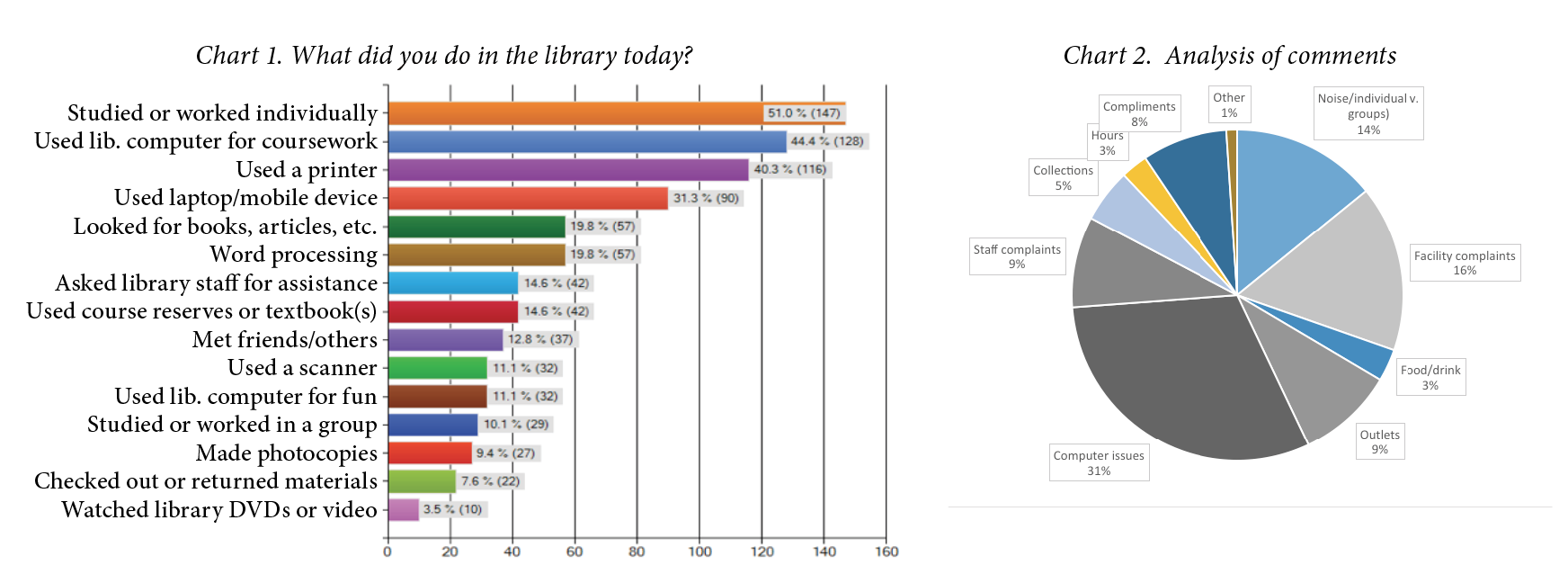Read the report in full here (PDF, 1 MB)
What did you do in the Library today? Think deeply about life. Sleep.
What can we do to make this library better for you? More access to electrical outlets…Why are they still located in walls?
These were some of the questions and answers from our second triennial survey of “in-library use,” conducted November 18-23, 2013. 294 library users (90% undergraduates and 9.8% graduate students) took the time to fill out a paper survey handed to them at the Library entrance. The results showed that our library users are a serious bunch: 51% came to the Library to study or work individually; 44.4% used a library computer for academic/course work and only 11% used a computer for Facebook, YouTube or other “fun” activity. Almost all students engaged in multiple activities (see Chart 1). They also came often: 24.4% came to the Library 4 or more times per week and 47% came 2-3 times per week.
Our users rate our services highly: Our top rating went to quality of databases and electronic resources where we scored 4.4 out of a possible 5. Even where we were rated lowest—on availability of electrical outlets—our users still scored us 3.68 out 5. These results were very similar to what we found in our first survey in November 2010: the students who come to the Library come frequently, and they come because they like what they find here. (Other surveys, discussed in earlier issues of Classified Information, have shown that the student body as a whole thinks well of the Library).
Click to view larger
To get meaningful information from this survey about how we could improve our “in-library” services, therefore, we turned to the last, open-ended question, “What can we do to make this library better for you?” Out of the 294 respondents, 124 took the time to write something (a total of 191 separate comments/complaints), and from the number of exclamation points and the length of the responses, it was obvious that the students cared and wanted to be heard. (See Chart 2) When we coded the answers we found that the single largest source of complaint was the lack of Microsoft Office—21 students complained about that (11% of the comments), followed by the need for more computers (19) and more outlets (18). It’s striking (though not surprising in this era of mobile devices) that fully 9.42% of the comments were about outlets; one student said, “More access to electrical outlets, specially at desks. Why are they still located in walls? they should be conveniently placed on desks.” Comparing the 2013 comments with the 2010 comments, there were fewer complaints about noise and Library hours, but more complaints about outlets and computers, even though we had added both outlets and computers after the 2010 survey. Students also continued to ask for more space to study individually and in groups.
We were concerned to note that, in addition, there was an increase in the number of complaints about staff and about long lines, and we realized that our ratings on “customer service” had fallen slightly from 2010. We wondered if this change might be related to the establishment of community hour in 2012. To examine this more closely, we analyzed separately those surveys that had been filled out during community hour and found that, in fact, the students visiting during community hour rated the Library slightly lower on every single measure with quality of customer service dropping to seventh place from third among the community hour respondents.
So what did we do in response to what the students told us? We are increasing the staff at the Circulation and Reserve desks from 1–3pm; we have added Microsoft Office to 16 computers in the Reference area on the Library’s upper level; and we have put in a Student Technology Fee proposal for mobile charging stations to try to address the lack of electrical outlets. We cannot expand the walls of the Library, but we have made our space needs known to the College, and are converting stacks space to study space where possible. We continue to listen hard to the voices of our users.
Professor Bonnie Nelson, Associate Librarian for Information Systems
—
